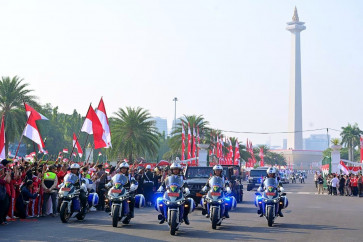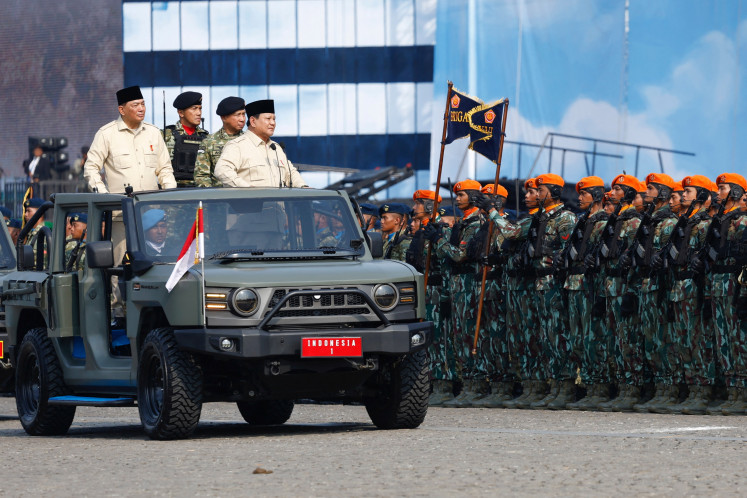Popular Reads
Top Results
Can't find what you're looking for?
View all search resultsPopular Reads
Top Results
Can't find what you're looking for?
View all search resultsLand acquisition remains a tough nut to crack
The arduous, complex and punitively costly process of land acquisition has been one of the biggest barriers constraining Indonesia’s infrastructure development
Change text size
Gift Premium Articles
to Anyone
T
he arduous, complex and punitively costly process of land acquisition has been one of the biggest barriers constraining Indonesia’s infrastructure development. Poor infrastructure has been among the greatest hurdles constraining investment since 2000 and the main cause of economic inefficiency and lack of competitiveness. The Jakarta Post’s Hasyim Widhiarto explores the issue. This is the first of two reports.
North Sumatra Planning Agency head Riadil Akhir Lubis took a deep breath when a crowd recently questioned the progress of construction at the province’s Kuala Namu International Airport.
While his replies are not clear-cut, his gesture suggests uncertainty about the airport’s completion, despite the central government’s target that the airport would be up and running by early 2013.
“It’s the land problems that disrupted the Kuala Namu construction,” Riadil said.
The airport — which began construction in 2006 — is among many cases of government-initiated infrastructure projects that have run aground due to protracted processes of land acquisitions.
But the hardest hit of all is undoubtedly the toll road projects, which are badly needed to resolve the country’s worsening traffic that have created not only a high-cost economy, but also logistical uncertainty.
So what exactly are the root causes hampering the process of land clearance for public infrastructure?
Although the causes are complex, stakeholders in the industry have mostly cited insufficient legal infrastructure and lack of law enforcement to implement existing regulations.
These issues are sometimes exacerbated by bureaucratic chaos at the National Land Agency, where a plot of land is often owned by more than one party, making it difficult for investors to settle claims.
These factors have ignited a land price speculation run by brokers, eventually causing project investment costs to soar and create an environment of uncertainty.
Deputy Public Works Minister Hermanto Dardark acknowledged that recently the costs of land acquisition for toll road projects had increased to between 30 and 40 percent of the total investment from an original estimate of between 20 and 25 percent, making them commercially unfeasible.
Hudaya Arryanto, president director of listed turnpike operator PT Citra Marga Nusaphala Persada (CMNP), shared the company’s experience regarding land acquisition debacles.
CMNP has seen sluggish progress with the construction of its 21.5-kilometer toll road that will link areas in Bogor and Depok in West Java to Jl. Antasari in South Jakarta.
However, the project ground to a halt in 2008 due to problems with land acquisition.
According to Hudaya, land speculation had increased the selling price of land earmarked for the project, which had skyrocketed by 42 percent to more than Rp 4 trillion (US$465 million) from Rp 2.8 trillion in less than five years.
With such soaring costs, the company is now struggling to seek new investment and support from the government and other third parties to resolve the problem.
Hudaya said the company had recently reached a deal with the government to amend its concession contract, which includes a government commitment to support future land acquisition for the project.
The company is upbeat about resuming construction in 2013.
“We are also planning to either issue bonds or apply for bank loans to help finance future land clearance,” he said.
Despite keen interest by private parties, criticism of the government has increased for its lack of action in helping to secure the required land.
Under a law on highways, the central government may cap the price of land for toll road projects and prohibit landowners from selling their land to parties not involved in the projects.
While landowners can file complaints with the courts, under the law, project construction cannot not be halted. However, the administration has yet to take the issue seriously.
Soon after President Susilo Bambang Yudhoyono took his second oath of office in October 2009, the government pledged to issue within its first 100 days in power a regulation-in-lieu-of-law to expedite the procedure for land acquisition. But, nothing happened.
Thirty years after state toll road company PT Jasa Marga opened the country’s first toll road, stretching 59 km to connect Jakarta, Bogor and Ciawi in West Java, the country has seen an insignificant increase in toll road construction.
As of early this year, Indonesia only had 758 kilometers of operating toll roads: about 697 km located in Java, 43 km in Sumatra and 18 km in Sulawesi. Last year, the Public Works Ministry targeted the construction of
at least 125 km of toll roads annually by 2014.
However, the target is nowhere close to the reality as 24 projects, with a combined 949-km road length in Java, have been idle since 2007 due to soaring land prices and construction costs, according to the Indonesian Toll Road Association.
Association chairman Fatchur Rochman said that although the government had tried to provide incentives for investors, many had proven to be ineffective.
“Take the land capping policy for example. In many cases, we have to provide land capping funds from our own equity that have not been immediately reimbursed by the state.”
“Instead of becoming a solution, the regulation has created another uncertainty for developers,” Fatchur said.
According to the prevailing regulation, toll road investors can claim reimbursements from the government should the price of acquired land soar by more than 10 percent of the initial estimate in the concession contract.
The problem in land acquisition has spiralled into delays in the completion of toll road networks, thus disrupting the business of operators with toll road sections up and running.
According to Fatchur, some operators have failed to generate sufficient revenue from their section as it has not been not supported by the operation of connecting sections.
“The Waru-Juanda toll road section in East Java, for example, sees a relatively low volume of traffic as completion of the nearby Surabaya–Mojokerto toll road remains unclear,” he said.
While Fatchur highlights the government’s lack of commitment to whetting investors’ appetites, Agrarian Reform Consortium (KPA) chairman Usep Setiawan believes dispute-prone land acquisitions are a result of bureaucracy impediments.
“More than 70 percent of landowners in Indonesia do not have legal documents to support their ownership,” said Usep.
“This will easily trigger disputes once the government insists on acquiring their land, even for the construction of public facilities.”
Aside from urging the government to intensify its land certification scheme, the KPA has also recommended the establishment of an agency to help settle land disputes.
According to the organization, there were 106 major land disputes across the country last year, 41 of which were triggered by the government’s plan to establish public facilities, including toll roads.
On Wednesday, dozens of police officers forcefully took over 15 land plots owned by four families in Bungurasih village, Waru, Sidoarjo, after the families refused to sell their land to make way for the 36-km Surabaya — Mojokerto turnpike.
The families felt disappointed with the offered price but declined to take the case to court.
As another move to deal with land acquisition problems, the government recently submitted a land acquisition bill to the House of Representatives for deliberation.
But analysts say the bill basically reinforces the current regulation on land clearance.
Under the bill, the government would set up a new entity called the General Service Agency (BLU) to provide loans to investors for land acquisitions. The House is expected to pass the bill by July.
“Once passed, the bill will provide investors with more certainty in planning their construction schedule amid land disputes,” said the head of the Toll Road Authority (BPJT) Achmad Gani Ghazali Akman.













